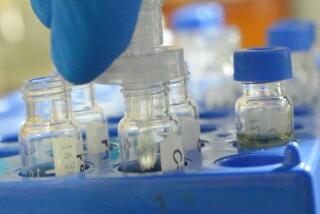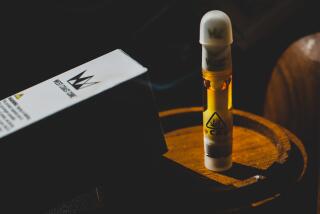Investigation Targets Labs for Unneeded Health Tests
Federal and state investigators are looking into allegations that Southern California medical diagnostic labs have billed insurance companies millions of dollars for unnecessary tests, often on healthy patients.
For more than a year, federal and state investigators have been targeting businessmen and doctors connected with about 80 diagnostic labs that are suspected of fraudulent testing. Involved in the investigation are the U.S. attorney’s office in Los Angeles, the FBI, the inspector general’s office of the U.S. Department of Health and Human Services, the state Department of Insurance fraud division and the state Board of Medical Quality Assurance.
In a separate inquiry, the Orange County district attorney’s office has been investigating similar complaints against four diagnostic labs.
Insurance officials say that in the last three to four years, a disturbing pattern has developed, involving several hundred Southern California diagnostic labs that allegedly solicit patients for unnecessary testing through health clubs, at chiropractors’ offices or by random phone calls. Some insurance officials have dubbed these firms “rolling labs” because some use portable equipment and operate out of vans.
While insurance policies generally do not cover medical screenings of healthy policyholders, company executives say, billings and computer-coded diagnoses from these labs have resulted in many payments that should not have been made. That means higher insurance costs for all consumers, said Jan Meisels, associate director for the Health Insurance Assn. of America, an insurance industry association based in Washington.
In the last 18 months, federal civil suits have been filed by Aetna Life Insurance Co., Metropolitan Life Insurance Co. and the Motion Picture Health and Welfare Fund against David and Michael Smuskevich. The suits accuse the Smuskevich brothers of fraud for operating as many as 42 labs in Los Angeles and Orange counties that allegedly billed insurance companies for unnecessary tests.
According to Metropolitan’s lawsuit, the company received claims for thousands of dollars in tests that indicated their clients were suffering from illnesses, when “often the diagnoses stated on the claims were simple fabrications, obtained from historical information received from the insured . . . to facilitate the payment of the claim.”
The Aetna suit claimed that the company was billed for expensive diagnostic tests that were never administered. It cited the case of a woman who was solicited at a health club, made an appointment for testing but never showed up. Nevertheless, the suit claimed, in May, 1985, Aetna was billed for $2,400 in tests by three diagnostic labs allegedly controlled by the Smuskevich brothers.
Michael J. Schroeder, an attorney for the Smuskevich brothers, said Aetna’s claim that patients were billed for tests that were never administered is false. He described all three lawsuits as “without merit.”
“The real problem is that they (insurance companies) just don’t want to pay for these tests,” Schroeder said. “They don’t believe in preventive medicine.”
Schroeder said each of the insurance companies sued his clients only after the Smuskevich brothers had sued them first in state court for failing to pay thousands of dollars in fees for lab tests.
In every case, Schroeder said, the tests were administered correctly--on the written order of a doctor who was not compensated by the Smuskevich labs.
“A diagnostic lab is kind of like a gas station,” Schroeder explained. Just as a gas station fills a customer’s request for gas, a diagnostic lab simply follows a doctor’s order and runs a test. “You don’t turn around and say, ‘Do you need gasoline?’ That’s not the diagnostic labs’ role.”
Doctors Suspected
However, Adam Radinsky, an attorney for the Motion Picture Health and Welfare Fund, said some doctors who prescribed the tests were involved in a “fraudulent relationship” with the labs. The doctors “were being paid by the Smuskevich entities” and were sometimes told what tests to prescribe, Radinsky said.
The Motion Picture Health and Welfare Fund lawsuit alleges a conspiracy between doctors and certain diagnostic labs.
Schroeder denied Radinsky’s claims.
He also noted that the older Smuskevich brother, David, 36, is not now involved in any of the labs. Since May, he has been serving a three-year federal prison term at the Boron Federal Prison in Kern County on his conviction for soliciting kickbacks in connection with a Norwalk diagnostic lab. But insurance company executives from Metropolitan, the Prudential Insurance Co. of America and other major firms contend their problems with diagnostic labs extend far beyond the alleged fraud involving the Smuskevich brothers.
The insurance company executives, frustrated by the continuing diagnostic lab operations, were eager to talk about their problems. But most officials from the federal and state investigative agencies said they could not comment.
Judy Holtz, a spokeswoman for the inspector general’s office of the U.S. Department of Health and Human Services, did confirm that an investigation was under way. A state government source also confirmed that a federal-state task force has been investigating the labs.
In the case of the district attorney’s investigation, a prosecutor in the fraud division of the office said solicitors for the labs appear to have misrepresented their tests by claiming in some cases that they can detect a person’s vulnerability to cancer or heart disease over the next 10 years. Deputy Dist. Atty. Gay Geiser-Sandoval added that she has received several phone solicitations at her home.
“They’re really using scare tactics to have people tested who may not have anything wrong with them,” she said.
The labs’ pitch to health-conscious Californians sounds appealing, said Gail Love, public information director of Hoag Memorial Hospital Presbyterian, who said that in November she received a call from a firm offering free testing.
The telephone solicitor checked with Love to make sure she had insurance, then offered “valuable diagnostic services . . . that could save my life,” including ultrasound exams and a test that “could diagnose cancer anywhere in my body,” she said.
Skeptical, Love said she didn’t have time for the test, but she reported the solicitation to hospital executives as misleading.
Insurers complain that the tests--which often include unusual vascular flow studies, ultrasound exams and cardiac studies for minor problems such as high blood pressure--are billed at $2,000 to $12,000 a patient.
They say many patients don’t know about the high charges because the bills--and sometimes the test results as well--usually are sent only to the patient’s insurance company.
Although insurance companies are aggressively monitoring claims and rejecting many, the problem labs are hard to keep track of, company executives said.
“What they do is, they change names, and they change locations every week,” said Rhenn Darensburg, director of claims for Prudential Insurance in Woodland Hills. Darensburg said he knew of 350 labs in Southern California with questionable claims, about 80 of them in Orange County.
Some insurers said they are reluctant to reject such claims completely for fear of being sued, so they often pay a portion of a questionable claim. That practice often has made it difficult for officials to pursue fraud charges, one federal investigator said.
High Cost of Defense
“Even if it’s a baseless claim, the cost of defense is extraordinarily high,” said George Enfield, vice president of United Insurance Co. of America in Chatsworth. “It’s better for us . . . to identify the proper amount of the claim and to pay that than to go out . . . . and sue. But these people have gotten to be such a big problem that we are starting to talk among ourselves,” exchanging information about problem labs with other insurance companies.
For about three years, Dr. William L. Marr, medical director of Pacific Mutual in Fountain Valley, has been reviewing “aberrant” claims--he does not call them fraudulent--and forwarding copies to the state Department of Insurance’s fraud division for investigation.
Last July, he received a telephone call at home from a solicitor who first verified that he had insurance and then invited him and his wife to come in for free tests.
Marr said he and his wife were in good health but, curious to see a lab’s operation, they reported as directed to the South Coast Cardio-pulmonary Medical Group in Santa Ana for testing and a physical exam.
Leafing through a thick report he wrote for his company on the tests, Marr said last week that he especially remembered the physical. It lasted about five minutes, Marr said, and he remained fully clothed as a doctor felt his pulse, listened to his heart through his shirt and asked him to hop up and down several times.
$295 for 5-Minute Exam
The doctor at the lab then billed Marr’s insurance company $295 for a “comprehensive physical exam,” he said.
And, based on findings from the physical that Marr had a history of “palpitation, heart disease and hyperlipedemia (high cholesterol levels),” the examining doctor authorized tests costing another $7,387 at South Coast and at another lab, Fitness Spectrum Medical Group in Tustin.
Based on Marr’s argument that none of the tests were medically justified, his insurance company refused to pay for the physical and rejected all but $108 in bills for the other tests. Marr said Pacific Mutual actually paid the $108 in error but has been unsuccessful in recouping it.
The offices of South Coast Cardio-pulmonary, formerly located in a medical building on Hemlock Way in Santa Ana, closed several months ago, other tenants in the building said, and the lab’s phone number has been disconnected. The osteopath who performed Marr’s exam now has an office in Palm Desert but did not respond to requests for an interview.
Fitness Spectrum is still in business in a Tustin shopping center. The firm operates a health spa downstairs--complete with weight room, jacuzzi and swimming pool--and upstairs a large testing area that is attractively furnished with plush couches and diagnostic equipment beside black Chinese-style room dividers decorated with birds.
A woman named Zora, who identified herself as Fitness Spectrum’s general manager, declined to comment on Marr’s claims.
Marr recently recounted his experience with the lab to officials from the Orange County Medical Assn. and to two committees from the state Board of Medical Quality Assurance.
Dr. Milton E. Legome, chairman of OCMA’s quality assurance committee, said he had heard complaints about unwarranted diagnostic tests and huge lab bills for several years.
Patients would be better off visiting their personal physicians in the first place, he said, because if one of the diagnostic labs does find an abnormality with its battery of tests, the patient’s personal physician will probably have to repeat the test to verify its findings.
Times staff writers Jim Carlton and George Frank contributed to this story.
More to Read
Sign up for Essential California
The most important California stories and recommendations in your inbox every morning.
You may occasionally receive promotional content from the Los Angeles Times.










